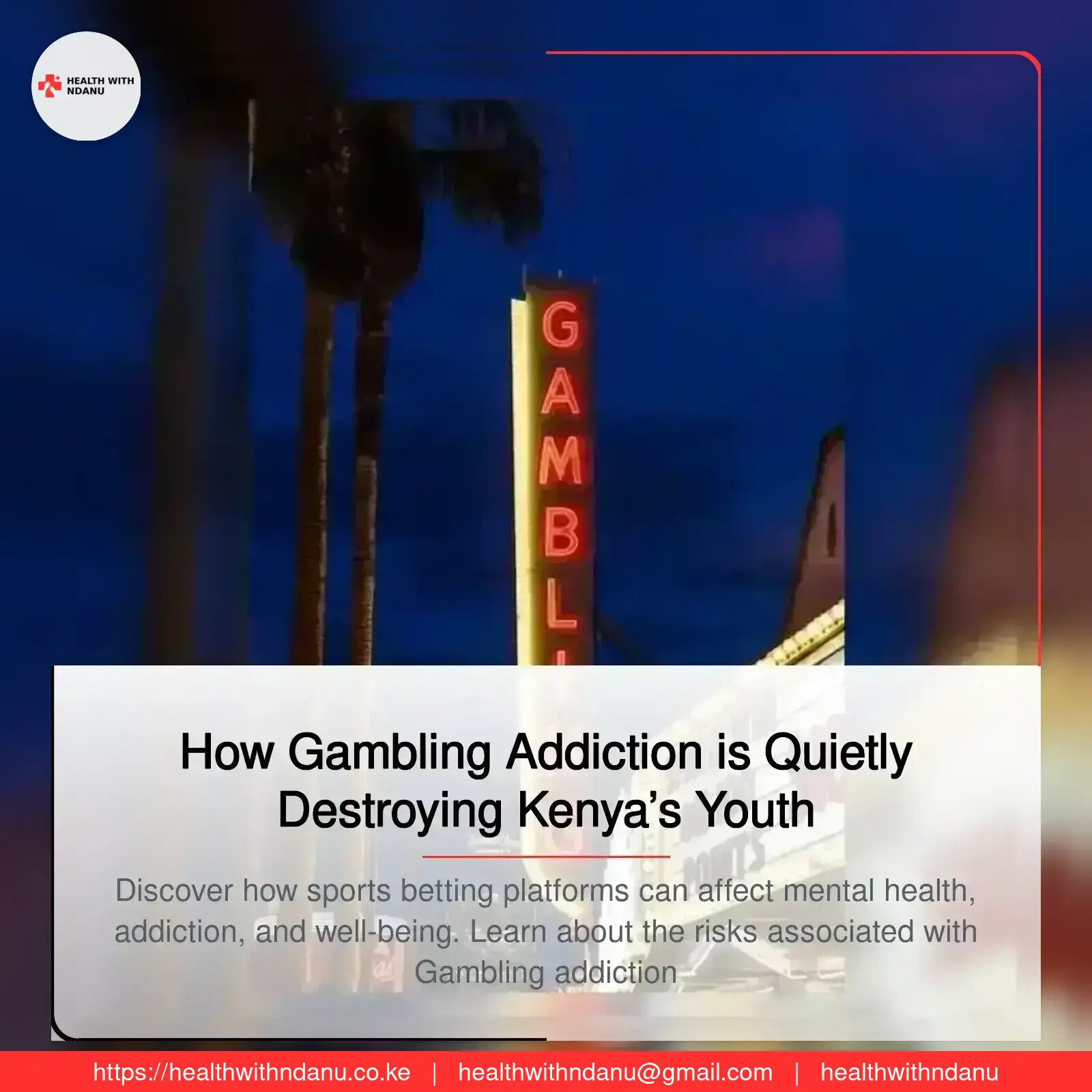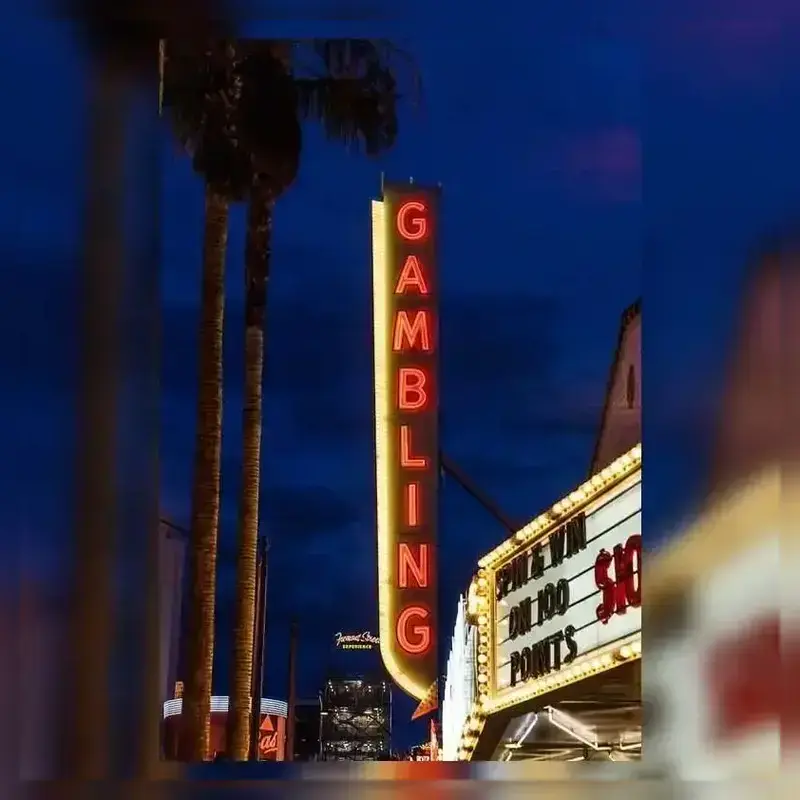How Gambling Addiction is Quietly Destroying Kenya’s Youth
- by Diana Ndanu
- 09 April, 2025
- 0 Comments
- 6 Mins



Let’s Have the Conversation Nobody Wants to Have
You’ve seen it.
Maybe it's the young man glued to his phone at the boda stage, anxiously checking a football app. Or the college student spending their lunch money at a cyber café placing “just one more bet.” Or maybe it’s your younger brother, cousin, or even your own child who’s fallen into the trap.
Gambling — especially sports betting — has quietly but firmly taken hold among Kenya’s youth. It’s now one of the most widespread addictions affecting mental health, education, relationships, and even physical well-being.
And yet, we’re not talking about it enough.
The Numbers Speak Loudly — And They’re Worrying
Let’s look at the stats:
- Over 76% of Kenyan youth aged 17–35 have engaged in betting, with the highest prevalence among university students and unemployed youth.
- Kenya ranks 3rd globally in youth gambling participation (Geopoll 2022).
- Some youths bet over Ksh 5,000 a month, money meant for food, school, or savings.
- The average bettor places a wager at least once daily, often more during football season.
This isn't just a casual hobby anymore — it’s an addiction problem.
So, Why Are Youth Betting So Much?
It’s easy to blame peer pressure or bad choices. But it’s deeper than that.
1. Unemployment and Financial Stress
With youth unemployment hovering above 35%, many young people see betting as a “quick fix” to escape poverty. They dream of winning big and transforming their lives overnight.
2. Easy Access to Betting Platforms
Thanks to smartphones, mobile money, and cheap internet, you can bet anytime, anywhere — even on credit. Betting apps are as common as TikTok on most phones.
3. Aggressive Advertising
Billboards, social media influencers, YouTube ads — betting companies know how to target youth. They glamorize winners, offer welcome bonuses, and constantly shout “bet now, win big!”
4. Lack of Regulation
Even with some restrictions in place, many betting platforms still operate unchecked. Underage betting is rampant, and enforcement is weak.
From Bet to Burden: The Health Effects of Gambling Addiction
At first, it looks harmless — just Ksh 50 on Arsenal vs Man U. But over time, it grows. And so do the consequences.
1. Mental Health Struggles
- Anxiety, stress, and depression are very common among addicted gamblers.
- Constant losses lead to feelings of hopelessness and worthlessness.
- Many report insomnia, restlessness, and low self-esteem.
2. Addiction and Loss of Control
Gambling releases dopamine — the same “feel-good” hormone triggered by drugs. The brain becomes addicted, chasing the next high.
Signs include:
- Lying about betting habits
- Chasing losses with more bets
- Borrowing money or stealing to bet
- Skipping school or work
3. Suicidal Thoughts
It’s alarming but real. Cases of suicide linked to gambling debts have been reported, especially among students and young adults.
4. Impact on Relationships and Family
Addiction often leads to broken trust, fights at home, and social isolation. Some youth lose friendships, romantic partners, or family support due to their gambling habits.
5. Neglect of Physical Health
Betting addicts often neglect eating, sleeping, or exercising. Some even develop ulcers due to stress or use alcohol or drugs to cope.
Real Stories, Real Struggles
Kelvin, 24 – Nairobi University Dropout
> “I started with 100 bob bets. Then it became 500, then 1,000. I used my school fees thinking I’d double it. I lost everything. I was too ashamed to tell my parents and dropped out.”
Amina, 19 – College Student in Mombasa
> “I wanted to help my family by winning. I saw friends getting lucky. I got addicted. Now I owe my roommate Ksh 7,000 and I’m scared to go back home.”
These stories aren’t rare — they’re becoming the norm.
The Silent Epidemic: Why We Don’t Talk About It
Gambling addiction in Kenya is underreported and undertreated because:
- It’s not seen as a “real addiction” like alcohol or drugs.
- Families feel shame or embarrassment.
- Youth fear judgment or punishment if they speak out.
- But silence only worsens the problem.
What Can Be Done? Solutions That Work
1. Open Up the Conversation
- Let’s break the silence. Parents, teachers, churches, and youth leaders need to talk openly about gambling and its dangers — without judgment.
- Host forums. Invite counselors. Share stories. Let youth know it’s okay to seek help.
2. Early Education on Gambling Risks
Schools should include gambling awareness in life skills or CRE lessons. Just like we talk about drugs, let’s talk about betting.
Teach:
- How addiction works
- How gambling companies operate
- How to identify early warning signs
3. Counseling and Mental Health Support
Addiction is a mental health issue — and needs professional help.
- Counties should fund addiction counseling services.
- Establish youth-friendly mental health clinics in every ward.
- Offer helplines and peer support groups for those seeking help.
4. Limit Access to Betting Apps
The government can:
- Restrict betting ads, especially during prime time and on youth platforms.
- Enforce age verification more strictly.
- Ban betting on credit or using airtime.
5. Provide Alternatives
Youth need positive outlets. Give them:
- Job opportunities and entrepreneurship programs
- Sports, arts, and tech hubs
- Volunteering and mentorship platforms
- Let’s offer hope beyond gambling.
How Parents and Guardians Can Help
- Be present. Know what your child is doing online.
- Watch for changes in mood, money habits, or sleep.
- Don’t just punish — listen. Create a safe space for open talk.
- Seek help early. If your child is struggling, connect with a counselor or support group.
How Youth Can Help Themselves and Each Other
- Check yourself. Are you betting more than you can afford? Are you always chasing losses?
- Talk to someone. A friend, a teacher, or a health worker — don’t carry it alone.
- Uninstall betting apps and block related content if you’re trying to quit.
- Support a friend who’s struggling — don’t mock or shame them.
Resources: Where to Find Help for Gambling Addiction in Kenya
- Chiromo Hospital Group – Offers addiction counseling and rehab.
- Nacada Kenya – Runs awareness programs and helplines for addiction.
- BasicNeeds Kenya – Supports youth mental health programs.
- Your local health center – Ask about addiction counseling or mental health services.
- Religious institutions and youth groups – Some run anonymous support groups.
Final Thoughts: Betting on Hope, Not Odds
The truth is, gambling isn’t just a game anymore. It’s a health crisis. One that’s quietly robbing our youth of their potential, confidence, and peace of mind.But with awareness, support, and honest conversations, we can turn things around.You’re not weak if you’re struggling. And you’re not alone. Help is available — and recovery is possible.Let’s bet on better choices. On real opportunities. On a future where our youth thrive — not gamble it away.
Want to keep learning about youth health, mental wellness, and real-life stories from Kenyan communities? Stay connected with us at HealthWithNdanu.co.ke
Got Your Own Experience? Share with us
Popular Categories
Mablogu Zinazobambwa Sana
Daily Newsletter
Get all the top stories from Blogs to keep track.



